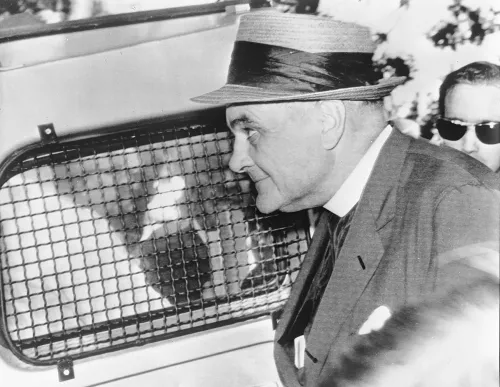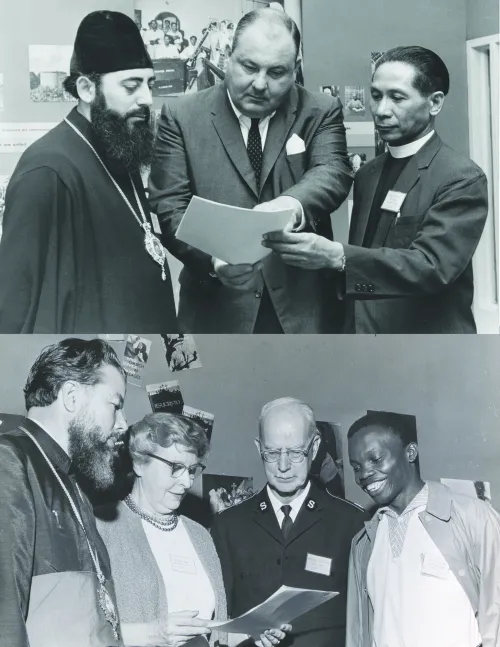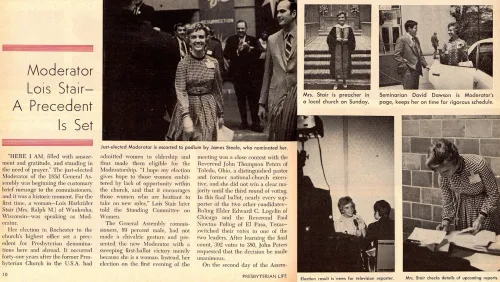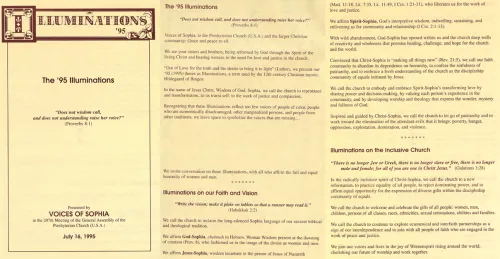This month in Presbyterian history
July’s highlights include arrests and a trailblazing General Assembly moderator

Stated Clerk Eugene Carson Blake missed the fireworks on Independence Day in 1963 — he was a bit busy, being arrested for trespassing.

Blake was one of 283 people arrested on the grounds of the Gwynn Oak amusement park, a segregated institution outside of Baltimore. A week before, the National Council of Churches appointed Blake as head of its Commission on Religion and Race. Blake, who had been elected Stated Clerk of the United Presbyterian Church in the U.S.A. in 1958 and would serve in that position until 1966, had previously served as the president of the National Council of Churches from 1954 to 1957. The activists, all members from the Council on Racial Equality and the Baltimore Clergymen’s Interfaith Committee, had gathered to challenge the owners of the amusement park to desegregate.
Police and security guards were standing at the ready when the buses carrying the participants pulled up to Gwynn Oak’s front gate, where Blake and Furman Templeton, a Black Presbyterian elder, stepped forward and requested admission. When Templeton was denied entry, Blake pressed the matter, saying they wanted to ride the miniature Baltimore and Ohio Railroad — to no avail. He and the others were booked for trespassing, fingerprinted, pleaded not guilty, and were released on bond. Charges against Blake were ultimately dropped. A 16mm film taken of the arrest, with some of Blake's speeches on civil rights dubbed over it, was widely distributed by the church. You can watch it here, in Pearl.

Just over a week after Blake’s arrest in Baltimore, the World Council of Churches hosted the Fourth World Conference on Faith and Order, a church-unity-study-conference. Held in Montreal, the meeting drew “some 500 Protestant, Anglican and Orthodox church leaders and theologians.” From the captions of these images, we discover that the crowd consisted of more than 270 delegates from 50 countries, and that they gathered to hold “further sincere mutual discussion of questions dividing Christendom.”
Seen here are just a handful of the attendees. In the top image, we see three leaders from three different churches — Russian, American, and Philippine — discussing a study paper together. From left, they are Archimandrite Kotlyarov, one of 15 Russian Orthodox Church delegates in attendance; Dr. James McCord, president of Princeton Theological Seminary; and the Rev. M.V. Ga of the Philippine Independent Church. In the bottom image, we see another of the small groups organized for conversation. From left are Father Theoctiste of Bucharest, a delegate from the Romanian Orthodox Church; Mrs. Porter Brown, general secretary of the Woman’s Division of Christian Service of The Methodist Church in the U.S.; Commission Wycliffe Booth, a leader of the Salvation Army in Canada, and the Rev. I.O.A. Ude of the Presbyterian Church of Nigeria, who was a student in Canada at the time of the July conference.

On the first day of July 1971, Presbyterian Life published a headlining article about the newly elected Moderator, Lois Stair — who, by taking the podium at the 183rd General Assembly, became the first woman elected as moderator of the UPCUSA.
Women first became eligible to serve as moderators in 1930 when the PCUSA General Assembly opened the position of ruling elder to them. During that 40-year interim, Stair developed her leadership skills in different positions, serving as a ruling elder at the First Presbyterian Church in Waukesha, Wisconsin, and as a moderator of Milwaukee Presbytery and the Synod of Wisconsin before being elected as Moderator of the UPCUSA.
Stair discussed being the first woman moderator with good cheer, but she also addressed the issues at hand within the country and the UPCUSA. As moderator, she wanted to lead congregations away from their “cozy comfortableness” and toward diversity. She called for reorganizing church programs to emphasize such issues as equality and the protection of minorities. As moderator, Stair modeled the bravery and confidence to listen, reflect, and speak forthrightly about Presbyterians following Christ during challenging times.
The last page of the article highlights Stair’s post-election remarks, in which she revealed the source of her courage: “There is too much lack of confidence, loss of nerve, among churchmen. Pastors suffer from low morale, women feel inferior, minorities and youth wonder if equality will ever be a reality … We must have confidence. It is available to us through Jesus Christ, and through the Holy Spirit working through us to do so much more in the glory of God.”

In mid-July 1995, in Cincinnati, Ohio, a new organization presented its first newsletter to the 207th General Assembly. Voices of Sophia (VOS), a group that promoted feminist and womanist theology, was organized the year before as a response to the backlash against the 1993 Re-Imagining conference.
The conference had focused on bringing feminist theologians from outside the U.S. to Minneapolis to gather and host discussions. Critics warned against Re-Imagining’s message that feminists could push the boundaries of orthodoxy and still be Christian. Immense criticism was heaped upon all Presbyterians who attended, as well as the PC(USA) Women’s Ministry Unit for supporting the conference. Mary Ann Lundy, head of the unit, was removed from her position.
The following year, a special impact group was gathered to focus on the issues raised by the Re-Imagining conference and the backlash it received. Voices of Sophia became an official organization one year later, at the 207th General Assembly.
With the stated goal of “transforming the Church into a discipleship of equals,” VOS held annual Gatherings from 1994-2003, offered breakfasts/speakers at General Assemblies from 1995 onward, distributed a newsletter titled Illuminations, created a website, and grew a membership that peaked at over 500 members. A membership mailing in 2002 states VOS’s purpose to “call the Church into accountability, and fulfill the Gospel and General Assembly policy, regarding women’s theologies, inclusiveness, and diversity.” VOS was an active organization from its inception until 2010, when it merged with the Witherspoon Society to form Presbyterian Voices for Justice (PV4J). Explore a student-designed digital exhibit about Voices of Sophia on the Building Knowledge and Breaking Barriers website.
You may freely reuse and distribute this article in its entirety for non-commercial purposes in any medium. Please include author attribution, photography credits, and a link to the original article. This work is licensed under a Creative Commons Attribution-NonCommercial-NoDeratives 4.0 International License.




